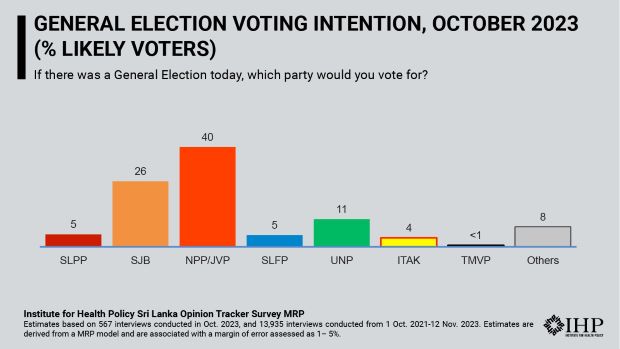COLOMBO– Support for the National People’s Power (NPP) party among Sri Lanka’s voters dipped marginally to 40% in October but the leftist party managed to maintain its notable lead over the main opposition Samagi Jana Balawegaya (SJB) and the president’s United National Party (UNP), polling data showed.
The NPP had enjoyed support from 42% of likely voters in September, while the SJB stood at 26% in October, increasing 4% from 22% in September. President Ranil Wickremesinghe’s UNP’s support decreased marginally to 11% in October from September’s 13%. The ruling Sri Lanka Podujana Peramuna (SLPP) also saw a decrease to 5% from the previous month’s 8%.
The Sri Lanka Opinion Tracker Survey (SLOTS) was conducted by the Institute for Health Policy (IHP), an independent, non-partisan research centre based in Colombo, Sri Lanka.
According to the IHP, SLOTS combines interviews from a national sample of adults (ages 18 and over) reached by random digit dialling of mobile numbers, and others coming from a national panel of respondents who were previously recruited through random selection. IHP estimates voting intent using an adaptation of Multilevel Regression and Post-Stratification (MRP), with multiple imputations to account for uncertainties in its modelling, exploiting data from all SLOTS interviews to estimate voting in a particular month.
The October 2023 MRP estimates were based on 567 interviews conducted in October 2023, and 13,935 interviews conducted overall from 1 October 2021 to 12 November 2023, with a margin of error assessed as 1–3% for the SLPP, SLFP, ITAK, TMVP and 3–5% for the SJB, NPP/JVP, UNP and the other parties. As the October update uses a more recent data set than the previous update, there are small changes in estimates of voting shares for previous months. A total of 100 stochastic simulations were used in the modelling to estimate margins of error, the IHP said.
“MRP is a method that is increasingly used by polling firms in other countries to leverage small samples, most notably by YouGov which used it to forecast results of the UK Brexit Referendum and recent UK general elections. All estimates are adjusted to ensure the sample matches the national population with respect to age, sex, ethnicity, socioeconomic status, education, geographical location, and voting in the 2019 Presidential and 2020 General Elections.”
The SLOTS is funded by the Neelan Tiruchelvam Trust, the UK National Institute for Health and Care Research (NIHR), the Asia Foundation in Sri Lanka, and others, but the sponsors play no role in the study design, analysis, or interpretation of findings. Interested parties can contact IHP for more detailed data and results, the IHP said.
-economynext.com



Comments are closed, but trackbacks and pingbacks are open.